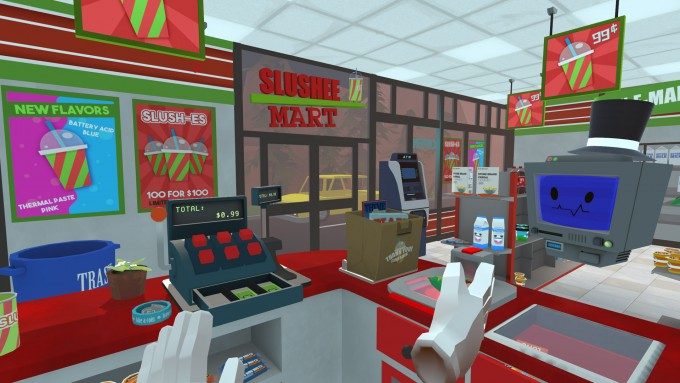

LISTEN TO THE VOICES OF VR PODCAST
Wise says that one of the key design principles of Job Simulator was to make sure that everything was interactive. Their goal was to not make it feel like a game, but rather that people would get so lost in the plausible interactions that they’d be able to achieve a deep sense of presence. She cites the example of making tea in that they had to account for the dozens of different ways that people make their tea in order to maintain that level of plausibility that they’ve created in their virtual world. If it’s not intuitive, then the rules and limitations of the simulation make it feel like a game rather than just executing a task given that the affordances of the environment match their expectations of how it should behave.
This reflects what Kimberly Voll recently said about having a fidelity contract where affordances match the user’s expectations. It also seems to validate Mel Slater’s theory of presence with the Place Illusion and Plausibility or what Richard Skarbez would describe as immersion and coherence.
Designing for agency and plausibility has been a key theme in my previous interviews with Owlchemy Labs’ Alex Schwartz from GDC 2015, Vision Summit 2016, and PAX West 2016.
Owlchemy Labs was able to do such a good job at creating a sense of presence in people that Wise said that it would often create a bit of an existential crisis since it blurred their boundaries of reality. VR developers talk about this as the sense of presence in VR, but there isn’t a common language for people who are having a direct experience of VR presence for the first time.
Wise asks, “How do you talk about the ‘not real’ real? Or how do you talk about the imaginary real life?” And that if people were able to have a direct lived experiences within a virtual simulation, and it felt completely real, then it begs the question of whether or not we’re already living in a simulation. The Atlantic did a profile on people who experienced a post-VR existential crisis that made them question whether actual reality is real or not.
Hassan Karaouni recently told me that if we’re not already in a simulation, then we’re most certainly going to create virtual realities that are indistinguishable for reality that will have intelligent agents within these simulations who will be asking these exact same questions.
Wise has explored the line of thinking of “How far deep do the layers of inception go?” many times, and I’ve also started to have more conversations with people in the VR community about simulation theory and it’s implications.
Wise has been on the front-lines of having these types of interactions with users of experiences from Owlchemy Labs, and it’s only natural that these types of VR experiences start to make people question the balance between fate and free will in their lives as VR experiences enable new expressions of our agency in what could be classified as an “Erlebnis” direct experience within an incepted virtual reality.
VR is starting to give us more and more experiences that are impossible to have in reality, and our memories of these experiences can be just as vivid as “real life” experiences, which further blurs the line between the “virtual” and “real.” The long-term implications of this are still unclear, but what is clear is that Owlchemy Labs has been focused on the principles of Plausibility and Agency, which mirrors what OSSIC CEO Jason Riggs recently declared that the future is going to be Immersive and Interactive.
If we are in a simulation, then it’s possible that we may never be able to reach base reality. As we continue to experience simulations that are more and more indistinguishable from reality, then perhaps the best that we can do is to strive to reach the deepest sense of presence at each layer of inception that we discover.
Support Voices of VR
- Subscribe on iTunes
- Donate to the Voices of VR Podcast Patreon
Music: Fatality & Summer Trip

